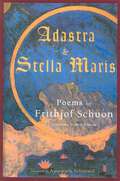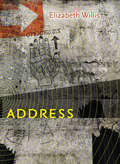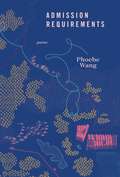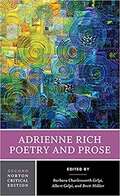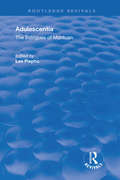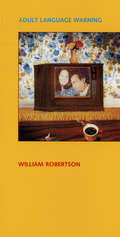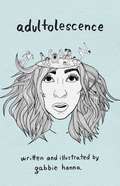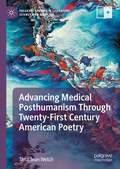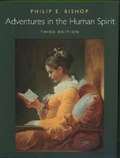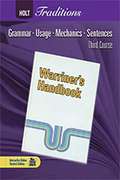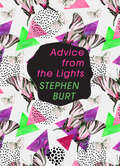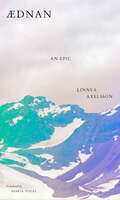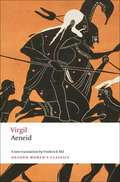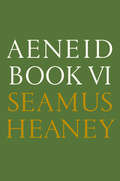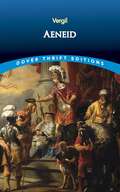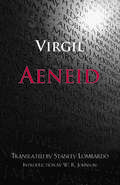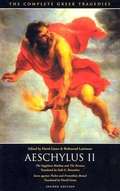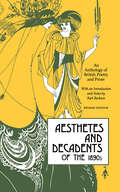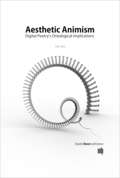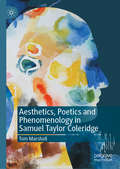- Table View
- List View
Adastra & Stella Maris: Poems by Frithjof Schuon
by Frithjof SchuonThe spiritual traveler may carry this German/English bilingual book of poems for a lifetime and not exhaust its content.
Address (Wesleyan Poetry Series)
by Elizabeth WillisAddress draws us into visible and invisible architectures, into acts of intimate and public address. These poems are concentrated, polyvocal, and sharply attentive to acts of representation; they take personally their politics and in the process reveal something about the way civic structures inhabit the imagination. Poisonous plants, witches, anthems, bees--beneath their surface, we glimpse the fragility of our founding, republican aspirations and witness a disintegrating landscape artfully transformed. If a poem can serve as a kind of astrolabe, measuring distances both cosmic and immediate, temporal and physical, it does so by imaginative, nonlinear means. Here, past and present engage in acts of mutual interrogation and critique, and within this dynamic Willis's poetry is at once complexly authoritative and searching: "so begins our legislation."
Adhoora Aasman Gazal Sangrah: अधूरा आस्माँ (ग़ज़ल संग्रह)
by Vinod Asudani Rajesh Asudani 'Raqeeb'‘अधूरा आस्माँ’, इस पुस्तक की रचना उन दो संवेदनशील रचनाकारों ने की है जिनकी आँखों ने कभी रोशनी को महसूस तक नहीं किया है । गहन अंधेरे के अन्तहीन समन्दर की अनंत गहराइयों में जिनकी संवेदनाओं ने जिंदगी के हर उजले-काले पक्ष को देखा है, महसूस किया है और भोगा भी है, उन आसूदानी बंधुओं (श्री विनोद आसूदानी और श्री राजेश आसूदानी 'रकीब') ने जिंदगी के साथ गुफ्तगू करती हुई इस पुस्तक की रचना कर मानवीय क्षमता की एक और बुलंदी पर अपना नाम दर्ज कर दिया है। गज़ल संग्रह में विनोद और राजेश की पचास - पचास इस तरह कुल एक सौ गज़लें समाहित है। कवियों ने बहर और वज़न का पूरा-पूरा ध्यान रखने का प्रयास किया है और सभी गज़लें बहुत अच्छी हैं - पठनीय हैं । हाँ दो-तीन गजलें ज़रूर ऐसी है जिन्हें कुछ और तराशा जाता तो वे और अधिक निखर जातीं । गजलों की भाषा आम बोलचाल की भाषा वाली सरल सहज हिंदुस्तानी' है जिसे उर्दू के शब्दों ने और अधिक आकर्षक और प्रभावशाली बना दिया है ।
Adio
by Bitoriano Gandiaga ArtetxeBaserri familiako giroa lana zen. Bakardadea, mendia, isiltasuna, gaua, ipuinak. Oraindik ere umetako mendiak entzuten ditut Arantzazun. Gauez "tzi-tzi-tzi..." mendia beteta dago zurrumurruz, argiz, ipuinez, misterioz, beldurrez. Mendiko isiltasuna esaten da beti, eta egia da, baina mendiko isitasun berezi bat da, gauza harrigarriz bete-beterik.
Admission Requirements
by Phoebe WangA debut collection from a startling new voice in Canadian poetry.The poems in Admission Requirements attempt to discover what is required of us when we cut across our material and psychic geographies. Simultaneously full and empty of its origins, the self is continually taxed of any certainties and ways of being. The speaker in these poems is engaged in a kind of fieldwork, surveying gardens, communities, and the haphazard cityscape, where the reader is presented with the paradoxes of subsumed histories. With understated irony and unsettling imagery, the poems address the internal conflicts inherent in contemporary living.
Adrienne Rich: Poetry and Prose
by Adrienne Rich Albert Gelpi Barbara Charlesworth Gelpi Brett C. MillierThis Norton Critical Edition includes: <p><p> • Generous selections of poetry and prose from the entire oeuvre of one of America’s most influential poets. • An introduction and explanatory annotations by Barbara Charlesworth Gelpi, Albert Gelpi, and Brett Millier. • Fifteen reviews and critical commentaries, nine of them new to the Second Edition, carefully chosen as a guide to Adrienne Rich’s poetics―and to her poetics as related to politics―ranging from W. H. Auden’s 1951 response to her first book to critics’ reviews of the magisterial Collected Poems in 2016. • A Chronology, a Selected Bibliography, and an Index.
Adulescentia: The eclogues of Mantuan (Routledge Revivals)
by Lee PiephoFirst published in 1989, Piepho has translated the Latin works of Mantuan’s eclogues, which play such a crucial role in the culture of Western Europe during the sixteenth and seventeenth centuries.
Adult Language Warning
by William RobertsonAt the time of writing this book, William Robertson was a homemaker. His poems bring a new passion to the ancient domestic scene, and to everything else he looks at out of that often-turbulent centre. He ventures with care "into a swelling sea/ of silted meanings" equipped with his own elegant flexible vernacular, shaped precisely to the task of lighting up the trials and wonders of ostensibly ordinary days. These poems ring like crystal-hard edges of a tender heart.
Adultolescence
by Gabbie HannaA collection of more than 150 witty and edgy poems about love and relationships from the YouTube comedian and vlogger behind ‘The Gabbie Show’. Gabbie Hanna disarms the sacred and elevates the mundane in this exhilarating debut collection of illustrated poems. Ranging from the sing-song rhythms of children’s verses and a sophisticated confessional style, Gabbie explores the emotionally charged space between childhood and womanhood, revealing her own longings, obsessions, and insecurities along the way. Adultolescence heralds the arrival of an artist with a magical ability to connect through alienation, bury truth bombs within observations about pizza cravings and social media, and detonate wickedly funny jokes between moments of existential dread. You’ll turn to the last page because you get her, and you’ll return to the first page because she gets you.
Advancing Medical Posthumanism Through Twenty-First Century American Poetry (Palgrave Studies in Literature, Science and Medicine)
by Tana Jean WelchAdvancing Medical Posthumanism Through Twenty-First Century American Poetry places contemporary poetics in dialogue with posthumanism and biomedicine in order to create a framework for advancing a posthuman-affirmative ethics within the culture of medical practice. This book makes a case for a posthumanist understanding of the body—one that sees health and illness not as properties possessed by individual bodies, but as processes that connect bodies to their social and natural environment, shaping their capacity to act, think, and feel. Tana Jean Welch demonstrates how contemporary American poetry is specifically poised to develop a pathway toward a posthuman intervention in biomedicine, the field of medical humanities, medical discourse, and the value systems that guide U.S. healthcare in general.
Adventures In The Human Spirit (Third Edition)
by Philip E. BishopExceptionally student-friendly, extensively illustrated, and engagingly thought-provoking, this one-volume historical survey of the humanities is accessible--and inviting--to readers with little background in the arts and humanities. Carefully balanced among the major arts, philosophy, and religion and finely focused on selected principal events, styles, movements, and figures, it brings the past to life by including authentic documents from daily life, comparative global perspectives, and examples from literature, philosophy, music--including the contributions of women and minority artists. For individuals waiting to discover the humanities' rich connections to their own
Adventures in English Literature (Heritage Edition)
by Leopold Damrosch Leonard F. Dean William Reach Getald LevinThis book is an effective compilation of literary works by various authors, ranging through the Anglo-Saxon period to Elizabethan to Victorian age, Shakespeare to John Milton to Bernard Shaw.
Advice from the Lights: Poems
by Stephanie Burt“The brightest and most inviting of Burt’s collections for readers of any, all, and no genders.”—Boston ReviewAdvice from the Lights is a brilliant and candid exploration of gender and identity and a series of looks at a formative past. It’s part nostalgia, part confusion, and part an ongoing wondering: How do any of us achieve adulthood? And why would we want to, if we had the choice? This collection is woven from and interrupted by extraordinary sequences, including Stephanie poems about Stephen’s female self; poems on particular years of the poet’s early life, each with its own memories, desires, insecurities, and pop songs; and versions of poems by the Greek poet Callimachus, whose present-day incarnation worries (who doesn’t?) about mortality, the favor of the gods, and the career of Taylor Swift. The collection also includes poems on politics, location, and parenthood. Taken all together, this is Stephen Burt’s most personal and most accomplished collection, an essential work that asks who we are, how we become ourselves, and why we make art.
Aednan: An Epic
by Linnea AxelssonThe winner of Sweden&’s most prestigious literary award makes her American debut with an epic, multigenerational novel-in-verse about two Sámi families and their quest to stay together across a century of migration, violence, and colonial trauma.In Northern Sámi, the word Ædnan means the land, the earth, and my mother. These are all crucial forces within the lives of the Indigenous families that animate this groundbreaking book: an astonishing verse novel that chronicles a hundred years of change: a book that will one day stand alongside Halldór Laxness&’s Independent People and Sigrid Undset&’s Kristin Lavransdatter as an essential Scandinavian epic.The tale begins in the 1910s, as Ristin and her family migrate their herd of reindeer to summer grounds. Along the way, forced to separate due to the newly formed border between Sweden and Norway, Ristin loses one of her sons in the aftermath of an accident, a grief that will ripple across the rest of the book. In the wake of this tragedy, Ristin struggles to manage what&’s left of her family and her community.In the 1970s, Lise, as part of a new generation of Sámi grappling with questions of identity and inheritance, reflects on her traumatic childhood, when she was forced to leave her parents and was placed in a Nomad School to be stripped of the language of her ancestors. Finally, in the 2010s we meet Lise&’s daughter, Sandra, an embodiment of Indigenous resilience, an activist fighting for reparations in a highly publicized land rights trial, in a time when the Sámi language is all but lost.Weaving together the voices of half a dozen characters, from elders to young people unsure of their heritage, Axelsson has created a moving family saga around the consequences of colonial settlement. Ædnan is a powerful reminder of how durable language can be, even when it is borrowed, especially when it has to hold what no longer remains. &“I was the weight / in the stone you brought / back from the coast // to place on / my grave,&” one character says to another from beyond the grave. &“And I flew above / the boat calling / to you all: // There will be rain / there will be rain.&”
Aeneid
by Frederick Ahl VirgilFrederick Ahl's new translation captures the excitement, poetic energy, and intellectual force of the original in a way that has never been done before. Ahl has used a version of Virgil's ancient hexameter, a swift-moving six-beat line varying between twelve and seventeen syllables, to reproduce the original poetry in a thrillingly accurate and engaging style. This is anAeneidthat the first-time reader can grasp and enjoy, and whose rendition of Virgil's subtleties of thought and language will enthrall those already familiar with the epic. Unlike most translators, Ahl has chosen to retain Virgil's word-play, the puns and anagrams and other instances of the poet's ebullient wit. "Like Shakespeare and the Greek tragedians, Virgil grasped that humor and earnestness are not mutually exclusive in art any more than they are in life. One should read theAeneidnot in solemn homage, but for enjoyment. " Enhanced by Elaine Fantham's Introduction, Ahl's comprehensive notes and an invaluable indexed glossary, this lively new translation brings readers closer to the original and the myriad enjoyments to be found there.
Aeneid Book VI: A New Verse Translation
by Seamus HeaneyA masterpiece from one of the greatest poets of the century. In a momentous publication, Seamus Heaney's translation of Book VI of the Aeneid, Virgil's epic poem composed sometime between 29 and 19 BC, follows the hero, Aeneas, on his descent into the underworld. In Stepping Stones, a book of interviews conducted by Dennis O'Driscoll, Heaney acknowledged the significance of the poem to his writing, noting that "there's one Virgilian journey that has indeed been a constant presence, and that is Aeneas's venture into the underworld. The motifs in Book VI have been in my head for years - the golden bough, Charon's barge, the quest to meet the shade of the father." In this new translation, Heaney employs the same deft handling of the original combined with the immediacy of language and sophisticated poetic voice as was on show in his translation of Beowulf, a reimagining which, in the words of James Wood, "created something imperishable and great that is stainless - stainless, because its force as poetry makes it untouchable by the claw of literalism: it lives singly, as an English language poem."
Aeneid: Aeneid, Book Viii: A Vocabulary And Test Papers; By Tutors Of University Correspondence College (classic Reprint) (Dover Thrift Editions: Poetry)
by VergilConsidered the greatest Roman poet, Vergil spent over a decade working on this monumental epic poem, which has been a source of literary inspiration and poetic grandeur for more than 2,000 years. Its twelve books tell the heroic story of Aeneas, a Trojan who escaped the burning ruins of Troy to found a new city in the west. This city, Lavinium, was the parent city of Rome.Drawn by divine destiny after the fall of Troy, Aeneas sailed westward toward the land of the Tiber. After many adventures, he and his men were shipwrecked on the shores of Carthage, where Aeneas and Queen Dido fell in love. Reminded of his duty, however, Aeneas sailed on. After visiting his father in the underworld, Aeneas saw the future of the Roman people and their exploits in peace and war. Eventually he arrived in Italy, where he and his men struggled valiantly to secure a foothold for the founding of Rome.Vast in scope, crowded with exciting adventure and heroic deeds, the Aeneid was Vergil's imagined account of Roman beginnings and a tribute to the history, character and achievements of the Roman people. On the other hand, its depth, vision and empathy with human suffering make the poem relevant to the general human condition. Now this enduring multileveled masterpiece is available in this republication of a standard unabridged translation, the most inexpensive complete version available.
Aeneid: Books Ix. , X (classic Reprint) (Hackett Classics)
by VirgilLong a master of the crafts of Homeric translation and of rhapsodic performance, Stanley Lombardo now turns to the quintessential epic of Roman antiquity, a work with deep roots in the Homeric tradition. With characteristic virtuosity, he delivers a rendering of the Aeneid as compelling as his groundbreaking translations of the Iliad and the Odyssey, yet one that--like the Aeneid itself--conveys a unique epic sensibility and a haunting artistry all its own.W. R. Johnson's Introduction makes an ideal companion to the translation, offering brilliant insight into the legend of Aeneas; the contrasting roles of the gods, fate, and fortune in Homeric versus Virgilian epic; the character of Aeneas as both wanderer and warrior; Aeneas' relationship to both his enemy Turnus and his lover Dido; the theme of doomed youths in the epic; and Virgil's relationship to the brutal history of Rome that he memorializes in his poem.A map, a Glossary of Names, a Translator's Preface, and Suggestions for Further Reading are also included.
Aeschylus II: The Suppliant Maidens, The Persians, Seven against Thebes, Promethus Bound (The Complete Greek Tragedies #2) (2nd edition)
by Aeschylus David Grene Richmond LattimoreThis volume contains the other four plays of Aeschylus not included in Richmond Lattimore's version of the Oresteia. With these two volumes a complete English Aeschylus is before the reader.
Aesthetes and Decadents of the 1890s: An Anthology of British Poetry and Prose
by Karl BecksonThe Aesthetic and Decadent Movement of the late 19th century spawned the idea of "Art for Art's Sake," challenged aesthetic standards and shocked the bourgeosie. From Walter Pater's study, "The Renaissance to Salome, the truly decadent collaboration between Oscar Wilde and Aubrey Beardsley, Karl Beckson has chosen a full spectrum of works that chronicle the British artistic achievement of the 1890s. In this revised edition of a classic anthology, "The Ballad of Reading Gaol" has been included in its entirety; the bibliography has been completely updated; Professor Beckson's notes and commentary have been expanded from the first edition published in 1966. The so-called Decadent or Aesthetic period remains one of the most interesting in the history of the arts. The poetry and prose of such writers as Yeats, Wilde, Symons, Johnson, Dowson, Barlas, Pater and others are included in this collection, along with sixteen of Aubrey Beardsley's drawings.
Aesthetic Animism: Digital Poetry's Ontological Implications
by David Jhave JohnstonA poetics appropriate to the digital era that connects digital poetry to traditional poetry's concerns with being.This book offers a decoder for some of the new forms of poetry enabled by digital technology. Examining many of the strange technological vectors converging on language, it proposes a poetics appropriate to the digital era while connecting digital poetry to traditional poetry's concerns with being (a.k.a. ontological implications). Digital poetry, in this context, is not simply a descendent of the book. Digital poems are not necessarily “poems” or written by “poets”; they are found in ads, conceptual art, interactive displays, performative projects, games, or apps. Poetic tools include algorithms, browsers, social media, and data. Code blossoms into poetic objects and poetic proto-organisms.Introducing the terms TAVs (Textual-Audio-Visuals) and TAVITS (Textual-Audio-Visual-Interactive), Aesthetic Animism theorizes a relation between scientific method and literary analysis; considers the temporal implications of animation software; and links software studies to creative writing. Above all it introduces many examples of digital poetry within a playful yet considered flexible taxonomy. In the future imagined here, digital poets program, sculpt, and nourish immense immersive interfaces of semi-autonomous word ecosystems. Poetry, enhanced by code and animated by sensors, reengages themes active at the origin of poetry: animism, agency, consciousness. Digital poetry will be perceived as living, because it is living.
Aesthetic Poetry
by Walter PaterTHE "aesthetic" poetry is neither a mere reproduction of Greek or medieval poetry, nor only an idealisation of modern life and sentiment. <P> <P> The atmosphere on which its effect depends belongs to no simple form of poetry, no actual form of life. Greek poetry, medieval or modern poetry, projects, above the realities of its time, a world in which the forms of things are transfigured. Of that transfigured world this new poetry takes possession, and sublimates beyond it another still fainter and more spectral, which is literally an artificial or "earthly paradise."
Aesthetics, Poetics and Phenomenology in Samuel Taylor Coleridge
by Tom MarshallThis book re-evaluates the philosophical status of Samuel Taylor Coleridge by providing an extended comparison between his work and the phenomenological theory of Edmund Husserl. Examining Coleridge’s accounts of the imagination, perception, poetic creativity and literary criticism, it draws a systematic and coherent structure out of a range of Coleridge’s philosophical writing. In addition, it also applies the principles of Coleridge’s philosophy to an interpretation of his own poetic output.
